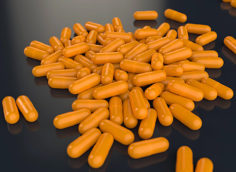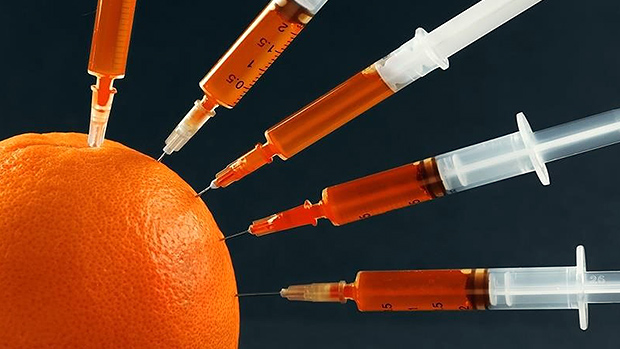The supplement business can be as crooked as a Mafia-owned tobacco company. Luckily, not every company fits into that category. There are a couple out there made of up of people who respect those who use their products and refuse to put a supplement on the market unless it's innovative, safe, and effective.
T Nation has always been up front about its relationship with Biotest. (We own it.) We don't play the games, but many companies do. Here's how some of them are being deceptive.
Back in the fifties, scandal rocked the music industry. Record companies, in order to build an audience for certain artists or releases, would pay radio stations to play their songs. It was done under the table and it was illegal.
Unfortunately, the supplement industry is guilty of this, too. Many companies offer a kickback to the clerks or salesmen at health food and vitamin stores. If the salesman behind the counter sells a bottle of their product to some geek, he gets paid a previously agreed upon amount of cash.
Ever wonder why the occasional salesman will pull out some product that you've never heard of and extol its virtues? Well, chances are good that he's just trying to pad his wallet.
This practice has become so widespread that just about every supplement company has been forced to, at one time or another, offer equal kickbacks just so that they'd be able to compete with other products on an equal footing.
Educated buyers don't have to worry about this sort of thing, but pity the poor newbie who walks out of a store with a shopping bag full of payola-induced purchases.
Below is an ingredients list that you might see on any one of a number of meal replacements:
SuperPro (unique blend of whey protein concentrate from specially filtered and ion-exchanged whey protein, calcium caseinate, milk protein isolate, taurine, L-glutamine, sodium caseinate, egg albumin, and calcium alpha-ketoglutarate [AKG])
Newbies see the listing for "SuperPro" and they think it's some sort of a magical, super-effective protein. It ain't no such thing.
It should come as no surprise to you that the FDA has labelling laws, and one of them requires that food manufacturers list ingredients by quantity. The ingredient that appears first on the list is the predominant ingredient, and the subsequent ingredients are listed in descending order of weight. If the product contains 100 grams of magic substance A, 50 grams of magic substance, B, and 25 grams of semi-magic substance C, substance A would have to appear on the label first, followed of course by B and then C.
As such, almost any MRP would ordinarily have maltodextrin listed as the first ingredient, and as most of you know, maltodextrin is a cheap, sweet, carbohydrate powder. But, no consumer wants to buy a protein drink where maltodextrin is the first ingredient, right?
Well hell, that's easy to get around. All you need to do is put a whole bunch of ingredients together, one or more of which might be protein, and trademark the conglomeration. Give it a fancy, magical name that then, in the FDA's eyes, the substance stands as its own entity. Then, naturally, your new magic substance gets to be first on the ingredient list. That's how things like Metamyosin came into existence.
The same thing happens with a lot of products.
Is it dishonest? Maybe not, but you gotta' admit it's just a little bit sneaky, especially if you go around touting the magical qualities of your spay-shul protein.
There's nothing magic about protein powders and MRPs. But not many companies have the integrity to come out and say, "Listen, this stuff's convenient, tastes goods, and the ingredients are of the highest quality available. But in the end, hey, it's just food."
Nope, instead they hype the product up so much that newbies and mentally deficient people think they've got their hands on chocolate flavored steroids. So how do the dirty supplement makers prolong the marketing hype? Well, we've known a couple of them to add a secret ingredient to the product, one not advertised on the label.
One trick is to put a little creatine in protein powders. Why would they do this? Simple. Although creatine can help you build muscle in the long run, one of the first things that happens is humungous water retention, causing users to sometimes gain a few pounds of water in the first week of usage. By sneaking in some creatine, users of the protein powders will think, "Golly, I done went and gained two pounds off this stuff in just a few days. I'm gonna be hyooooge!"
Some fat burners also have a little something extra added, typically a diuretic. Although these are usually claimed on the label (as they should be since it's the law), the ads seldom tell you why ingredients like dandelion root, damiana, sarsparilla root, buchu leaves, couch grass, corn silk, uva ursi leaves, and juniper berries are added. We'll tell you, though. They're added so you'll piss off a few pounds of water the first week and think that you're losing fat!
Many of the so-called topical "fat burners" on the market now are nothing more than localized diuretics, giving you temporary results (if any). You could get the same local water loss effect by using Preparation-H and plastic wrap, an old trick used by competitive bodybuilders the night before a show.
There have also been rumors that many of the early meal replacements, "engineered foods," and kitchen sink formulas had some type of illegal drug added to the first batch. One industry insider we know has proof of such shenanigans locked away in his desk. He has lab analyses that prove that small doses of a real anabolic steroid were added to the product. When early users got surprising results, word spread about the new "miracle" product and an entire industry was born. The evidence, if there was any to begin with, was literally consumed and the drug was never used again in later batches.
There are plenty of supplements out there that work, but these tend to be on the expensive side. The raw ingredients are costly and so is the manufacturing process. So how does a dirty (or in many cases, simply ignorant) supplement company still profit from today's hot supps? Easy. They use only a small amount of the active ingredient, just enough where they can legally claim it on the label, although not enough to actually do anything for the poor guy buying it.
This started with creatine of all things, which is silly because creatine is already cheap. It was discovered that many "no-name" store brands were selling buckets of nothing but sugar and poor quality protein and claiming the stuff had creatine in it. It did, but you'd have to eat the whole bucket to get even a measly five gram serving!
This was a popular trend of the "kitchen sink" products, powders than contained a little bit of seemingly every hot supplement on the shelves. Of course, there wasn't enough of anything in there to have much of an effect on the consumer, but gosh darn it, it sure looked good listing all that stuff on the label, didn't it?!
More recently, this dirty trick has been pulled with tribulus and some of the powdered methoxy-isoflavone products on the market. Sure, these powders contain methoxy, but not enough to help a person build muscle (and besides, powdered methoxy, without a specialized carrier, just doesn't work that well anyhow). Still, there are a lot more consumers out there who don't closely read labels than those who do, so these products are still raking in the dough, at least from first-time users who just don't know any better.
This relates closely to dirty trick number four, only this time the company uses enough of the right ingredient, they just use a poor quality and less effective version of it. This is being pulled a lot these days with Tribulus products. Word is spreading about the effectiveness of quality products like Alpha Male so other "me too" companies are rushing to put out their own versions.
The things is that there's a world of difference between quality Tribulus terrestris and the floor sweepings used by most companies. Sure, the cheapo companies can claim Tribulus on the label, but the consumer won't be getting the good stuff. It's sort of like choosing between a Porsche 911 and a Ford Escort. Hey, they both have four wheels, a motor, and doors and stuff, right? They're both labeled as cars, so what's the dif? (Plenty!)
This is also a popular underhanded trick used in the protein powder and MRP market. Sorry, but there's no way you're getting quality ingredients in those dirt cheap, five-pound buckets of protein. It's like the guy at the corner selling "Rolexes" for twenty bucks. Don't be scammed by him or the discount protein powders or supplements.
There are scores of companies in both the bodybuilding and longevity world who are selling GH products.
The trouble is, they're not selling real GH. They're selling what are hopefully GH secretagogues. In reality, the product is perhaps an amino acid like arginine, that, when taken in huge amounts on an empty stomach, can cause a temporary surge in GH. Never mind that you'd need to duplicate this surge several times a day in order for it to have any beneficial effects.
This is analogous to selling a hammer as a GH-releasing product. Pain often causes a release in GH so, if you hit yourself in the head with a hammer, you'll get a temporary surge in growth hormone. In order to support the efficacy of their hammer as a bodybuilding or life extending product, the supplement company is using research that was gleaned from studies that used real GH.
Only the uneducated consumer doesn't know any better.
Homeopathic companies are doing the same thing, but their products are based on a different theory. According to strict homeopathy, a chemical works in the body because it has a particular energy or resonance that has a specific effect. It's not the chemical itself that has an effect, but its vibrational energy. So, in an effort to distill this energy and make the most effective product possible, they "cicuss" it, which means they distill it in water over and over again. For instance, they might put one part substance A in 10 parts of water. They'd shake it up, and then put one part of the mixture in 100 parts of water and shake it up.
As such, the original substance becomes more and more dilute. In fact, they think that the most powerful medicines contain no molecules of the original subtance; only the vibrational chemical energy. Yeah, I know, I don't get it either.
Still, using research done on real GH to support their claims is downright wrong.
Everyone likes to see studies on new supplements, but this can be a double edged sword. After all, there are plenty of studies showing that HMB works great, yet 99% of people who've tried it will tell you it's worthless. So what's up with that?
One answer is that the supplement really does work... but only in very high dosages. HMB has been shown to work okay at 12 grams a day. But that's about 48 pills at the cost of 14 clams per day! Not realistic, especially for only mediocre results.
Pyruvate also comes to mind. Back around 1996, pyruvate caused some nipple hardening excitement among the fitness community. In one study performed before pyruvate became available, it supposedly increased fat loss by 48%. It was also supposed to minimize the loss of muscle while dieting and increase endurance. At one time, pyruvate was even supposed to be a prescription drug! Changes in dietary supplement regulations, however, allowed pyruvate and many other compounds to be sold legally without a prescription.
Pyruvate hit the market, everybody tried it and sure enough... no one noticed much, if any, fat loss. What the hell happened? Several things: the original studies were performed on very obese women who used 36 grams a day. However, when it hit the shelves the recommended dosage was somewhere around 2 to 5 grams a day. If you wanted to take as much pyruvate as was used in the original studies you'd have to spend ten to twenty bucks worth every day!
(Many people get sick to their stomachs at this dosage anyway and pyruvate also degrades rather quickly, so there's a chance you're not getting what you paid for if it's been on the shelf for a while.)
These days pyruvate is still being sold, but essentially it was D.O.A. from the very beginning.
One of the oldest tricks involving scientific studies is to perform the tests on a very select group of people and then assume it will work for everyone the same way. The problem is a study performed on 89-year-old women from Pakistan with two-pack-a-day smoking habits probably won't have the same effect on younger, weight trained males. (Remember boron?)
Basically, many companies use studies as window dressing, knowing that most people aren't going to go look them up.
This one isn't really a dirty trick, but it's still indicative of the character of a company.
Let's say one supplement company comes out with a new product. Another rival company immediately goes on the attack, saying the product is worthless. Then something happens: the public starts buying this stuff like crazy! They like it! Suddenly, the rival company decides this stuff ain't so bad after all and quickly rushes their own version to the shelves.
The fact is, there are two types of supplement companies out there. The first type will sell anything they can make a buck on whether they believe in the product or not. "If someone is out there buying powdered goat testicles, then dammit, we better start selling powdered goat testicles!" they say.
The other type of company avoids the bandwagon and only sells a product they truly think is efficacious – supplements they want to use themselves, in other words. We'll give you one guess which category most supplements manufacturers fall into.
Bottom feeders in the supplement industry abound. These companies usually watch the truly innovative leaders in the industry and either try to steal their ideas or pick up any "leftovers" tossed out in the garbage. We'll give you two examples.
At one time, in order to improve delivery into the body and pharmacokinetics, Biotest looked into making various prohormones into a new form called pentyl ethers. This was over two years ago. They dropped the idea because this stuff basically sucked when compared to other methods.
Of course, if you flip through the muscle mags today you'll see ads for this "new" product, a pentyl-ether version of all things, 5-estrogenic-to-the max-AD! Apparently, some companies care more about making a quick buck than they do about their poor customers who are losing hair and growing tits!
How does this happen? Well, sometimes the bottom feeders simply try to guess what the leader companies are doing. Other times they buy the dead idea from chemical companies. Then they rush the development and testing of the supplement in an attempt to beat the first company to the market. What results is often a sub-par copycat product. (This happened with one of the Androsol copies on the market.)
Beware the bottomfeeders.
Luckily, we can only think of one nasty little company who pulls this one on a regular basis, but one is bad enough. What happens is this: A good product is produced that's safe and highly effective. The Rat at the rival company either can't sell the stuff or is jealous because he didn't think of it, so he makes up some stories, rats the good company out, and starts screaming often enough and loud enough so that "da man," half in order to shut the guy up and half because he's unfamiliar with the science behind the product and is scared shitless, tells the supplement company to stop selling the supplement. Sure, the stoppage is "pending further investigation," but we all know that'll never happen.
The really sad part here is that consumers won't be able to buy good supplements because of the jealousy or sheer nastiness of one twisted individual. This threatens the whole future of effective supplementation. (In case you didn't know, something like this happened with our original T2 formula and is being attempted with some of Biotest's other products as well.)
We can understand if a company thinks its product is good, but in reality it doesn't pan out. That happens sometimes. But what if the company just outright lies about what the product is supposed to do?
We've seen many examples of this, from sugary "weight gainers" being promoted as fat loss supplements to, more recently, fat burners being sold as mass builders! Talk about pissing on the buyer's leg and telling him it's raining!
Of course, these companies just stick a few pictures of roided up pro-bodybuilders in their ads, the lowest of the low of all shady advertising techniques. But 90% of people are conned into believing the ad. A picture is worth a thousand words, and perhaps at least a couple of hundred lies.
New companies, in what must be an attempt to trick the uninitiated, often give themselves a name that's very, very, close to that of a respected phamaceutical company.
Most of you have no doubt heard of companies like Schering, Searle, Glaxo Wellcome, Merck, or SmithKline Beecham. Newbies have heard these names, too. They might not be able to identify them as pharmaceutical companies or be able to name any products they make, but they're vaguely familiar with the names. So, when they see a product on the shelf at the supplement store that has a name that's virtually identical to the names of one of these companies – with the exception of a few letters – they say to themselves, "Oh yeah, I've heard of that company. They must be legit."
And so they end up buying the products based on mistaken identity.
It sounds far-fetched but it happens all the time.
Likewise, there are a whole slew of supplement companies that sell various blends and concoctions of prohormones, but rather than admit that they're selling prohormones, they give their products names that are very, very close to those of known steroids. Equipoise becomes something like Equipose, or something very similar. What's more is that they list the actual Physician's Desk Reference description of the real drug in their product literature, thus strengthening the notion that this company, somehow, is selling steroids legally.
It's a crying shame.
Now, let us ask you a few questions: If a supplement maker uses these nasty tricks above, what do you think that company feels for its customers? How smart does that company think you are? Actually, they don't care what the smart consumer thinks; you're not their target audience! Instead they go after newbies and dumb folks, about the same crowd that calls Miss Cleo for tarot reading and buys those penis enlargement pills.
The moral of the story is to stick to companies you trust, those with good track records who offer money-back guarantees. And to be blunt, if a company screws you or anyone else, don't bend over for them again. Take your business elsewhere. There really are some good people in the supplement business, but you might have to look around awhile to find them.





